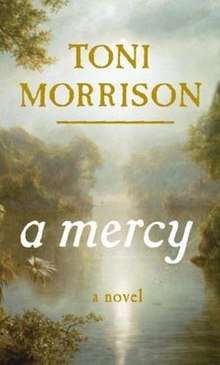A Mercy
A Mercy is Toni Morrison's ninth novel. It was published in 2008. A Mercy reveals what lies beneath the surface of slavery in early America. It is both the story of mothers and daughters and the story of a primitive America. It made the New York Times Book Review list of "10 Best Books of 2008" as chosen by the paper's editors.[1] In Fall 2010 it was chosen for the One Book, One Chicago program.[2]
 First US edition | |
| Author | Toni Morrison |
|---|---|
| Country | United States |
| Language | English |
| Genre | African-American literature |
| Publisher | Knopf |
Publication date | November 11, 2008 |
| Media type | Print (hardback, large print), unabridged audio CD, audiobook download, eBook |
| Pages | 176 pp (hardcover edition) |
| ISBN | 978-0-307-26423-7 |
| OCLC | 212855125 |
| 813/.54 22 | |
| LC Class | PS3563.O8749 M47 2008 |
| Preceded by | Love |
| Followed by | Home |
Synopsis
Florens, a slave, lives and works on Jacob Vaark's rural New York farm. Lina, a Native American and fellow laborer on the Vaark farm, relates in a parallel narrative how she became one of a handful of survivors of a smallpox plague that destroyed her tribe. Vaark's wife Rebekka describes leaving England on a ship for the new world to be married to a man she has never seen. The deaths of their subsequent children are devastating, and Vaark accepts a young Florens from a debtor in the hopes that this new addition to the farm will help alleviate Rebekka's loneliness. Vaark, himself an orphan and poorhouse survivor, describes his journeys from New York to Maryland and Virginia, commenting on the role of religion in the culture of the different colonies, along with their attitudes toward slavery.
All these characters are bereft of their roots, struggling to survive in a new and alien environment filled with danger and disease. When smallpox threatens Rebekka's life, Florens, now 16, is sent to find a black freedman who has some knowledge of herbal medicines. Her journey is dangerous, ultimately proving to be the turning point in her life.
Morrison examines the roots of racism going back to slavery's earliest days, providing glimpses of the various religious practices of the time, and showing the relationship between men and women in early America that often ended in female victimization. They are "of and for men", people who "never shape the world, The world shapes us". As the women journey toward self-enlightenment, Morrison often describes their progress in Biblical cadences, and by the end of this novel, the reader understands the significance of the title, "a mercy".
Reviews
- Gates, David (28 November 2008). "Original Sins". The New York Times. Retrieved August 28, 2019.
- Updike, John (3 November 2008). "Dreamy Wilderness: Unmastered Women in Colonial Virginia". The New Yorker. 38 (35): 112–113. Archived from the original on May 14, 2009. Retrieved April 17, 2009.
References
- "The 10 Best Books of 2008". The New York Times. December 3, 2008.
- One Book, One Chicago.